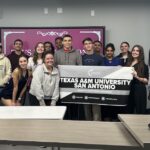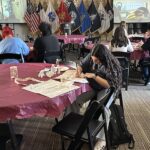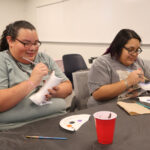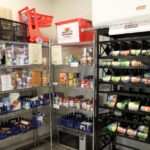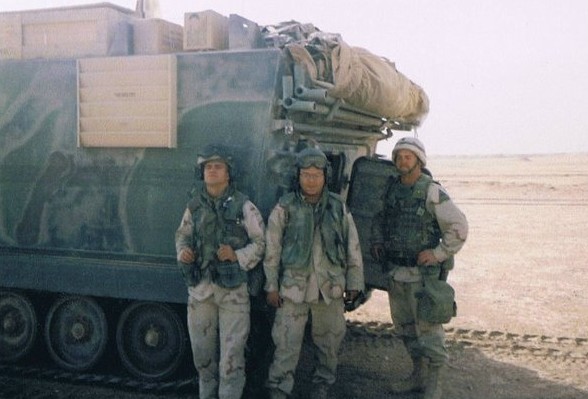
By Marie Bueno
Sometimes, while everyone is sleeping, Robert Garcia Jr. wakes with the overwhelming feeling of impending doom. His heart races, his hands turn clammy and his blood pressure raises through the roof.
“It’s impossible to take that deep breath I desperately need,” said Garcia, a Texas A&M-San Antonio political science junior. “And even if I could catch my breath, I’m afraid I won’t be able to handle it.”
Garcia, a veteran who served two tours including the Iraq War, suffers from post-traumatic stress disorder from his time on the battlefield.
He is just one of the veterans making the transition into civilian life at A&M-San Antonio, which made the Victory Media’s honor list four years in a row for the top 20 percent of schools embracing military service members. Victory Media is an online site for military members transitioning into civilian life.
During Garcia’s time at the university, he has met many other service members who endured battle wounds — wounds not always visible. These wounds, physical or not, impact their lives in a major way.
“I know no one will ever understand what I feel and what I went through except another fellow soldier,” Garcia said.
Garcia enlisted in the United States Army in April 2001. A few months later, on his last day of training, a major event happened that would change his life forever.
“Everyone ran to the drill sergeant’s car in the parking lot, that’s not something you do,” Garcia said. “Everyone was listening to the radio. It was September 11, 2001 and the terrorist attacks had just happened.”
At that moment, he knew he was going to war.
“There is no pill or therapy that will ever take this feeling away,” Garcia said. “Any service member knows there are things you see in war that no one should ever have to see. Sights, sounds and smells that change you forever.”
People may hear the term PTSD every day, but they may not even notice it. To Garcia, PTSD is punching the dresser in his sleep; it’s him pulling over on a busy highway because he can’t handle the anxiety of not having control in traffic; and it’s him constantly being on guard because the memory of being confined to the base camp in Iraq, knowing stepping outside the walls could cost him his life.
Garcia recalls one distinct memory that regularly haunts him.
“We were running alongside Humvees, camels running right there with us, while people fired at us and IEDs went off left and right,” he said. “I recall seeing a truck explode near us. After the explosion, we picked up the body parts and placed them in a trash bag. I remember two bodies, whose torn flesh felt cold, filled up only one bag.”
Memories of this sort are forever embedded in the minds of service members.
After being honorably discharged in 2008 and earning a bronze medal, Garcia and his then-wife’s transition to civilian life was not successful and they divorced. Like so many others, Garcia knows his PTSD from the war was the main factor.
“I think it’s very difficult for the spouse to get used to civilian life,” Garcia said. “They are not used to the husband being home and that’s where problems begin.”
PTSD affects more than his personal life. Occasionally, the anxiety and stress becomes overwhelming in class, to the point where focusing or even attending is a challenge.
Veteran students impacted by PTSD recently acquired campus resources through the university’s Patriots’ Casa.
“We want people to know we are here to help, even if they just want to come in and chat,” said Timothy Smith Jr., A&M-San Antonio’s military community liaison and a U.S Army retiree. “Our main focus is helping our military community with any services they need.”
Smith said A&M-San Antonio’s military community includes veterans, active duty, guard, reserve, spouses and children.
The Patriot’s Casa on the southeast side of the campus is dedicated to active and veteran military students, offering a computer lab, and lounge. Richard Delgado, director of military community development and army ROTC, said the Casa plans to add counseling services for veterans in January.
“Patriot’s Casa offers a computer lab and study rooms for service members,” said Smith, adding that they want students to utilize the spaces.
Whether in the classroom or in his personal life, Garcia works hard each day to overcome any obstacles his PTSD creates. With the help of counseling and support from his family and friends, he is managing his PTSD.
He remains optimistic about his future and plans to earn his bachelor’s in 2016 and continue on to a master’s degree. The most important thing to him is taking care of his family.
“You don’t think of what war could do to you, you just know as a child your favorite game was playing with those little green soldiers and that all you ever wanted to do was fight for your country,” Garcia said. “I’d do it all over again in a heartbeat.”
Jacob Beltran contributed to this report.
